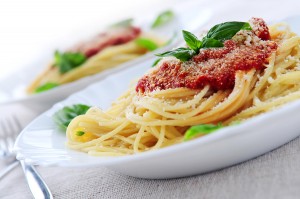
Your "whole wheat" pasta may actually be mostly white flour. Che tragedia!
You shouldn’t believe everything people say. Like Rick Santorum saying he isn’t racist (Not!), or Obama saying he doesn’t not not support discrimination against gays (Not!). But you’d think whole grain claims made by bread, cereal and pasta companies would be a little more honest and true. Not!
This week, the Center for Science in the Public Interest is petitioning the Food and Drug Administration in the United States to stop the misleading claims and labeling made by food manufacturers when it comes to whole grains. As many people know, adding whole grains to your diet brings many benefits, including better weight management, a 36 percent reduction in stroke risks, and a 28 percent reduction in heart disease risk. (source: The Whole Grains Council)
To cash in on people’s perceptions, many manufacturers have started adding the words “whole grain” or “whole wheat” to their food products even when it’s hardly the whole truth.
For example, from a report by the CSPI:
- Knorr Lipton Pasta Sides Made with Whole Grains is only 51 percent whole wheat.
- Nabisco Multi-Grain Wheat Thin Chips have only 10 percent whole grains.
- Ronzoni Healthy Harvest Whole Wheat Blend Pasta has no whole wheat flour.
- Kellog’s Eggo Nutri-Grain Pancakes Made With Whole Wheat have more sugar than whole wheat.
- DiGiorno Harvest Wheat Rising Crust requires you to eat 30 grams of white flour to get nine grams of whole wheat.
In the end, follow the advice your momma always told you: Don’t do drugs, and read product ingredient lists instead of relying on the marketing or labeling. Always verify that the label only contains 100 percent whole grain products, and watch for ways they try to sneak refined flours past your scrutinizing eyes. “Dead giveaways,” reports the CSPI, are the following terms: “enriched or unbleached wheat flour, semolina flour, durum flour, and rice flour.”


Trackbacks/Pingbacks
[…] So bring on the whole-grain crackers, right? Not so fast. Some products labeled “whole grain” actually contain very little of it—and some contain none at […]
[…] So bring on the whole-grain crackers, right? Not so fast. Some products labeled “whole grain” actually contain very little of it—and some contain none at […]
[…] So bring on the whole-grain crackers, right? Not so fast. Some products labeled “whole grain” actually contain very little of it—and some contain none at […]